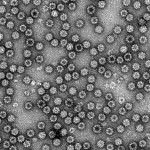
The results of a new clinical trial have found an experimental vaccine is highly effective against a strain of norovirus – the ‘bugs’ that may be responsible for over 90% of the stomach upsets collectively known as gastroenteritis.
According to the US Centers for Disease Control and Prevention (CDC), noroviruses cause, in developing countries, an estimated 200,000 deaths annually in children under the age of five. The virus is transmitted chiefly by food, water, or unwashed hands that have been contaminated by the feces of an infected person.
Developing a vaccine has been a research challenge. “Noroviruses can’t be grown in culture and don’t infect laboratory animals,” notes clinical virologist Robert Atmar of Baylor College of Medicine in Houston, Texas.
A breakthrough came in the early 1990s, when the Norwalk virus, a strain of norovirus, was cloned in the laboratory of molecular virologist Mary Estes, also at Baylor. Estes found that when a certain key protein from the virus was produced in cultured cells, the protein assembled itself into “viruslike particles” (VLPs) that could produce a strong immune system response in laboratory animals. VLPs mimic the virus’s structure closely enough to rouse the body’s immune system against the virus but do not contain any material that allows the virus to reproduce.
A VLP-based vaccine sharply reduced both the rate of infection and the severity of symptoms, as shown by the clinical trial led by Atmar, Estes, other researchers in other test centers. “This is a proof-of-concept study, the first to show that a vaccine can be effective against noroviruses,” Atmar says.
Additional studies, he says, are needed to monitor the vaccine’s success in a less-controlled setting – a military base or nursing home, for example. Atmar adds that whether the vaccine will confer protection against more than one strain of norovirus is still unknown. Further study includes a trial of an injected form of the vaccine that works against two different virus types.
Virologist Jan Vinjé of CDC calls the results of the new study encouraging. “It’s a very safe vaccine since it contains no viral genetic material,” he says. “A good next step would be to see whether the vaccine generates enough of an immune response to provide protection in elderly patients,” he adds, noting that the vast majority of outbreaks occur in long-term care facilities.

















